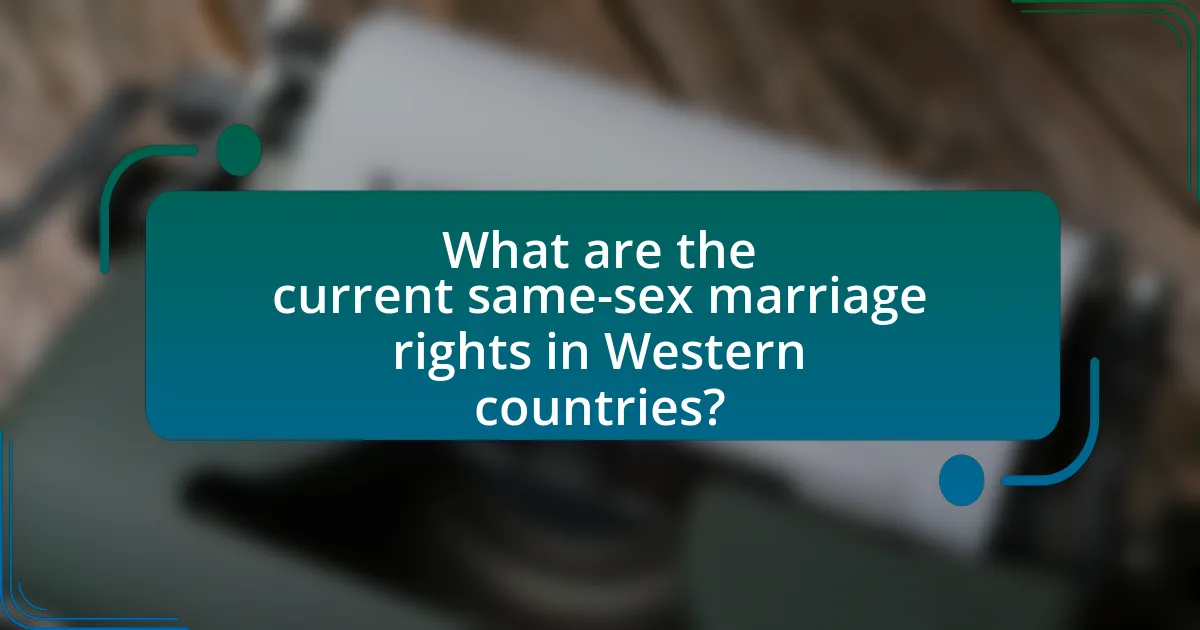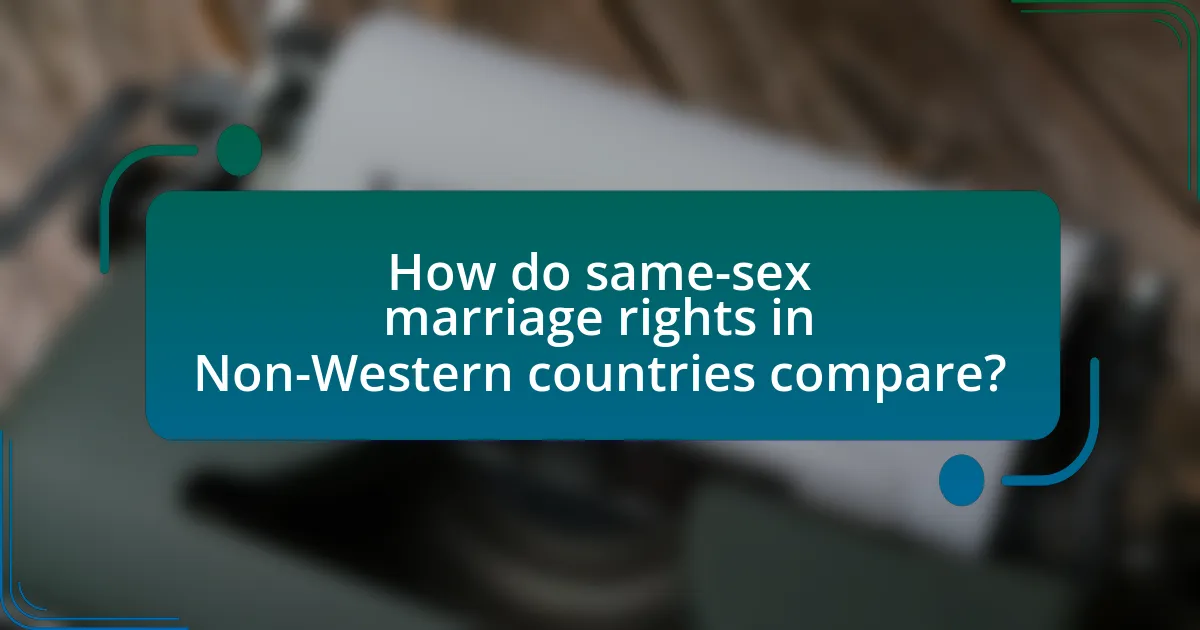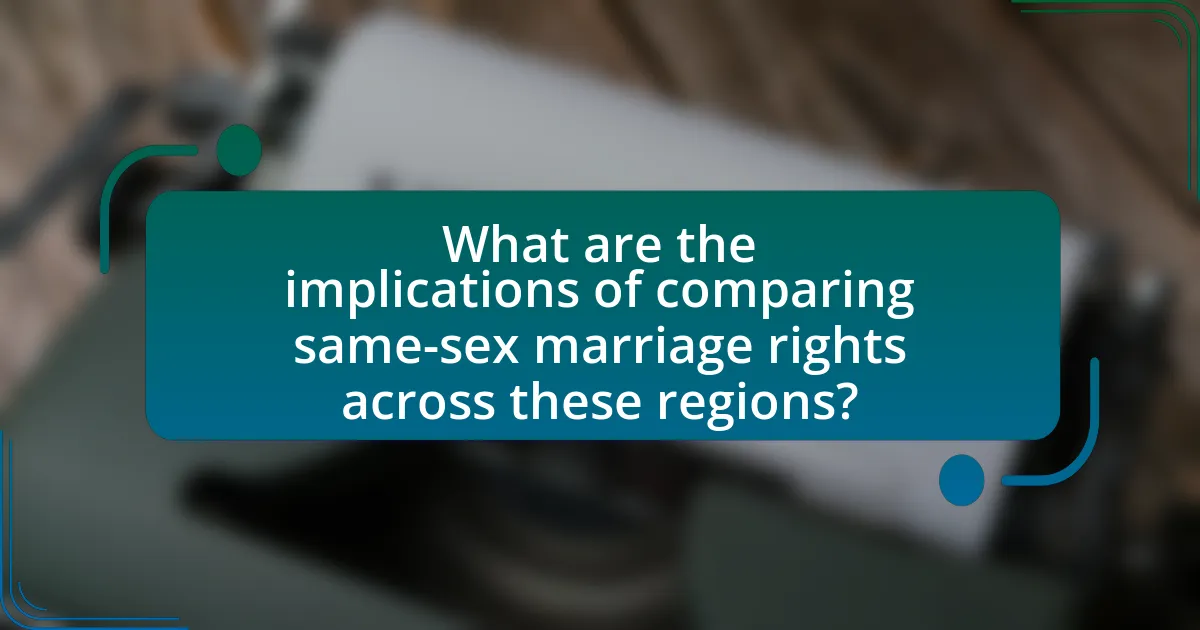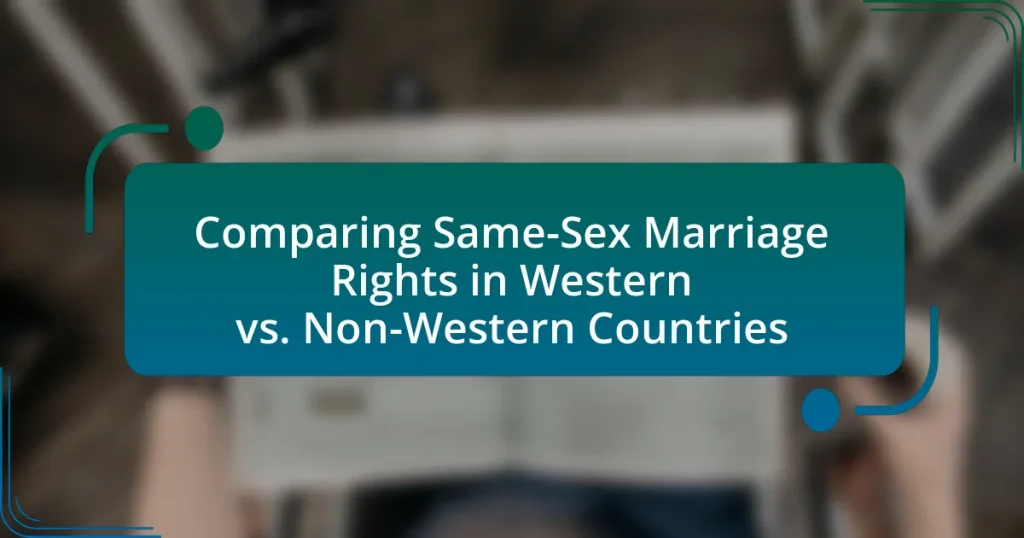The article examines the current state of same-sex marriage rights in Western and Non-Western countries, highlighting the legal recognition and societal acceptance of these rights. It details how various Western nations, such as the United States, Canada, and several European countries, have established legal frameworks supporting same-sex marriage, while contrasting this with the limited recognition in Non-Western countries, where many still criminalize same-sex relationships. The article also explores the influence of public opinion, cultural attitudes, and economic factors on the rights of same-sex couples, as well as the challenges they face despite legal recognition. Additionally, it discusses the role of international human rights frameworks and advocacy efforts in promoting equality for LGBTQ+ individuals globally.

What are the current same-sex marriage rights in Western countries?
Same-sex marriage is legally recognized in many Western countries, including the United States, Canada, most European nations, and Australia. As of October 2023, same-sex couples in these countries have the right to marry, adopt children, and access the same legal benefits as heterosexual couples. For instance, the U.S. Supreme Court’s 2015 ruling in Obergefell v. Hodges established that same-sex marriage is a constitutional right across all states. In Canada, same-sex marriage has been legal since 2005, and countries like Germany and the Netherlands have also legalized it, with the Netherlands being the first in 2001. This widespread recognition reflects a significant shift towards equality in marriage rights for same-sex couples in the Western world.
How do different Western countries approach same-sex marriage legislation?
Different Western countries approach same-sex marriage legislation with varying degrees of acceptance and legal recognition. For instance, countries like the Netherlands and Spain were early adopters, legalizing same-sex marriage in 2001 and 2005, respectively, setting a precedent for others. In contrast, countries such as Italy and Switzerland took longer to recognize same-sex marriage, with Italy legalizing civil unions in 2016 and Switzerland following suit in 2021. The United States legalized same-sex marriage nationwide in 2015 through the Supreme Court ruling in Obergefell v. Hodges, while Canada had already legalized it in 2005. These differences reflect a spectrum of cultural, political, and social attitudes towards LGBTQ+ rights across Western nations.
What are the legal frameworks supporting same-sex marriage in these countries?
The legal frameworks supporting same-sex marriage in various countries include constitutional provisions, legislative acts, and judicial rulings. For instance, in the United States, the Supreme Court ruling in Obergefell v. Hodges (2015) established the constitutional right to same-sex marriage, affirming that state bans on same-sex marriage violated the Fourteenth Amendment. In Canada, the Civil Marriage Act of 2005 legalized same-sex marriage nationwide, making it one of the first countries to do so through legislation. In contrast, countries like Germany legalized same-sex marriage through parliamentary vote in 2017, while in Taiwan, the Constitutional Court’s ruling in 2017 mandated the legalization of same-sex marriage, leading to the enactment of the Marriage Equality Act in 2019. These frameworks demonstrate a range of approaches, from judicial mandates to legislative actions, reflecting the evolving legal recognition of same-sex marriage globally.
How have public opinions influenced same-sex marriage rights in Western nations?
Public opinions have significantly influenced same-sex marriage rights in Western nations by shaping legislative changes and societal acceptance. For instance, as public support for same-sex marriage increased, particularly in the early 2000s, countries like Canada and the Netherlands legalized it, reflecting the growing acceptance among their populations. According to a 2020 Gallup poll, 67% of Americans supported same-sex marriage, a stark contrast to the 27% support recorded in 1996, demonstrating how shifting public attitudes can lead to legal reforms. Additionally, advocacy campaigns and visibility of LGBTQ+ individuals in media have further swayed public opinion, leading to more inclusive policies in countries such as the United States and Germany.
What challenges do same-sex couples face in Western countries despite legal recognition?
Same-sex couples in Western countries face challenges such as social stigma, discrimination, and unequal treatment in various aspects of life despite legal recognition. For instance, studies indicate that many same-sex couples experience hostility or rejection from family members and communities, which can lead to mental health issues. Additionally, legal protections may not extend to all areas, such as adoption rights or healthcare access, creating disparities in treatment compared to heterosexual couples. According to a 2020 report by the Williams Institute, approximately 30% of LGBTQ+ individuals in the U.S. reported experiencing discrimination in employment, housing, or public accommodations, highlighting ongoing societal challenges.
What are the social stigmas associated with same-sex marriage in these regions?
Social stigmas associated with same-sex marriage in various regions include discrimination, social ostracism, and negative stereotypes. In many non-Western countries, cultural and religious beliefs often lead to the perception that same-sex relationships are immoral or unnatural, resulting in significant societal backlash against individuals who identify as LGBTQ+. For instance, in regions where traditional family structures are highly valued, same-sex marriage may be viewed as a threat to social norms, leading to exclusion from community events and familial relationships. Additionally, studies indicate that individuals in these regions may face legal repercussions, harassment, or violence, further perpetuating the stigma surrounding same-sex marriage.
How do economic factors impact same-sex couples in Western countries?
Economic factors significantly impact same-sex couples in Western countries by influencing their financial stability, access to benefits, and overall quality of life. For instance, same-sex couples often face disparities in income and employment opportunities compared to heterosexual couples, which can affect their ability to afford housing, healthcare, and other essential services. According to a 2020 report by the Williams Institute, same-sex couples earn approximately 10% less than their heterosexual counterparts, which can limit their economic mobility and access to resources. Additionally, legal recognition of same-sex marriage in many Western countries has led to improved economic benefits, such as tax breaks and spousal benefits, further enhancing their financial security. However, economic inequalities persist, particularly for marginalized groups within the LGBTQ+ community, highlighting the ongoing challenges that economic factors pose for same-sex couples in these regions.

How do same-sex marriage rights in Non-Western countries compare?
Same-sex marriage rights in Non-Western countries vary significantly, with only a few nations recognizing such unions. For instance, Taiwan legalized same-sex marriage in 2019, becoming the first Asian country to do so, while countries like India decriminalized homosexuality in 2018 but have not yet legalized same-sex marriage. In contrast, many Non-Western nations, particularly in the Middle East and parts of Africa, maintain strict laws against homosexuality, with penalties including imprisonment or even death. This stark contrast highlights the limited progress in legal recognition of same-sex marriage in Non-Western countries compared to some Western nations, where such rights are more widely accepted and protected.
What is the legal status of same-sex marriage in various Non-Western countries?
Same-sex marriage is legally recognized in a limited number of Non-Western countries. As of October 2023, Taiwan is the only Non-Western country that has legalized same-sex marriage, doing so in May 2019. In contrast, countries such as Japan, South Korea, and India have not legalized same-sex marriage, although India decriminalized homosexuality in 2018, which has led to ongoing discussions about marriage equality. Other Non-Western nations, including many in the Middle East and Africa, maintain laws that criminalize same-sex relationships, thus prohibiting same-sex marriage.
Which Non-Western countries have made progress towards legalizing same-sex marriage?
Taiwan is the only Non-Western country that has made significant progress towards legalizing same-sex marriage, having legalized it in May 2019. This landmark decision followed a ruling by Taiwan’s Constitutional Court in 2017, which stated that the prohibition of same-sex marriage was unconstitutional, thus paving the way for legal recognition of same-sex unions.
What are the cultural and religious influences on same-sex marriage rights in these regions?
Cultural and religious influences significantly shape same-sex marriage rights in various regions. In Western countries, cultural acceptance and progressive religious interpretations often support same-sex marriage, as seen in nations like the United States and Canada, where legal recognition has been achieved through advocacy and changing societal norms. Conversely, in many Non-Western countries, traditional cultural values and conservative religious beliefs, particularly within Islam and Christianity, often oppose same-sex marriage, leading to legal prohibitions and social stigma. For instance, countries like Uganda and Nigeria have enacted laws criminalizing homosexuality, reflecting the strong influence of cultural conservatism and religious doctrine on public policy.
What obstacles do same-sex couples encounter in Non-Western countries?
Same-sex couples in Non-Western countries encounter significant legal, social, and cultural obstacles. Legally, many Non-Western nations do not recognize same-sex relationships, leading to a lack of legal protections and rights that heterosexual couples enjoy. For instance, in countries like Uganda and Nigeria, laws criminalizing homosexuality can result in imprisonment or violence against LGBTQ+ individuals. Socially, same-sex couples often face discrimination, stigma, and hostility from families and communities, which can lead to isolation and mental health issues. Culturally, prevailing norms and religious beliefs in many Non-Western societies often view homosexuality as taboo, further marginalizing same-sex couples and limiting their ability to live openly. These factors collectively create a challenging environment for same-sex couples seeking acceptance and equality in Non-Western contexts.
How do societal attitudes towards LGBTQ+ individuals affect same-sex marriage rights?
Societal attitudes towards LGBTQ+ individuals significantly influence same-sex marriage rights, as positive perceptions often lead to legal recognition and protection of these rights. For instance, in countries like Canada and the Netherlands, where societal acceptance of LGBTQ+ communities is high, same-sex marriage has been legalized, reflecting the public’s support for equality. Conversely, in nations with prevalent negative attitudes, such as many in Africa and the Middle East, same-sex marriage remains illegal, often accompanied by punitive measures against LGBTQ+ individuals. Research by the Pew Research Center indicates that countries with higher acceptance of LGBTQ+ individuals tend to have more progressive laws regarding same-sex marriage, demonstrating a clear correlation between societal attitudes and legal rights.
What role do governments play in either supporting or opposing same-sex marriage in Non-Western nations?
Governments in Non-Western nations often play a significant role in opposing same-sex marriage, influenced by cultural, religious, and political factors. For instance, many governments enact laws that explicitly prohibit same-sex marriage, reflecting societal norms that view such unions as incompatible with traditional values. In countries like Uganda and Nigeria, anti-LGBTQ+ legislation has been enacted, criminalizing same-sex relationships and reinforcing societal stigma. Conversely, some governments may support same-sex marriage as part of broader human rights initiatives, though this is less common. For example, Taiwan, while geographically in East Asia, became the first Asian nation to legalize same-sex marriage in 2019, indicating a shift in governmental stance influenced by public opinion and advocacy. Overall, the role of governments in Non-Western nations regarding same-sex marriage is predominantly characterized by opposition, with legal frameworks often reflecting prevailing cultural attitudes.

What are the implications of comparing same-sex marriage rights across these regions?
Comparing same-sex marriage rights across Western and Non-Western countries reveals significant implications for social equality, legal recognition, and cultural acceptance. In Western countries, such as the United States and Canada, legal frameworks support same-sex marriage, reflecting broader societal acceptance and human rights advancements, evidenced by the U.S. Supreme Court’s 2015 decision in Obergefell v. Hodges, which legalized same-sex marriage nationwide. In contrast, many Non-Western countries, such as those in parts of Africa and the Middle East, maintain laws that criminalize same-sex relationships, highlighting stark disparities in human rights and social norms. This comparison underscores the influence of cultural, religious, and political factors on the recognition of LGBTQ+ rights, illustrating how legal status can affect the lived experiences of individuals in different regions.
How do international human rights frameworks address same-sex marriage?
International human rights frameworks address same-sex marriage primarily through principles of equality and non-discrimination. The Universal Declaration of Human Rights and various international treaties, such as the International Covenant on Civil and Political Rights, emphasize the right to marry and found a family without discrimination based on sexual orientation. These frameworks have been interpreted by human rights bodies, such as the United Nations Human Rights Committee, to support the recognition of same-sex marriage as a fundamental human right, thereby obligating states to ensure legal recognition and protection for same-sex couples. This interpretation is reinforced by the growing number of countries that have legalized same-sex marriage, reflecting a shift towards greater acceptance and legal recognition of LGBTQ+ rights globally.
What are the key treaties and agreements relevant to same-sex marriage rights?
The key treaties and agreements relevant to same-sex marriage rights include the Universal Declaration of Human Rights, the International Covenant on Civil and Political Rights, and the Yogyakarta Principles. The Universal Declaration of Human Rights, adopted by the United Nations General Assembly in 1948, asserts the right to equality and non-discrimination, which has been interpreted to support same-sex marriage rights. The International Covenant on Civil and Political Rights, ratified in 1966, emphasizes the protection of individual rights, including the right to marry without discrimination. The Yogyakarta Principles, established in 2006, specifically address sexual orientation and gender identity, advocating for the recognition of same-sex relationships. These documents collectively provide a framework for advocating same-sex marriage rights globally.
How can global advocacy efforts influence change in both Western and Non-Western countries?
Global advocacy efforts can influence change in both Western and Non-Western countries by promoting awareness, shaping public opinion, and pressuring governments to adopt more inclusive policies. For instance, organizations like Human Rights Campaign and ILGA World have successfully mobilized international support for same-sex marriage rights, leading to legislative changes in countries such as Ireland and Taiwan. These efforts often utilize social media campaigns, international partnerships, and strategic litigation to highlight injustices and advocate for legal reforms. In Non-Western contexts, advocacy can also leverage cultural narratives and local partnerships to resonate with community values, as seen in the progress made in countries like India, where the decriminalization of homosexuality in 2018 was influenced by both local activism and global support.
What lessons can be learned from the comparison of same-sex marriage rights?
The comparison of same-sex marriage rights reveals significant lessons about societal values and legal frameworks. Firstly, it demonstrates that cultural acceptance and legal recognition of same-sex marriage often correlate; countries like Canada and the Netherlands, which legalized same-sex marriage early, exhibit higher levels of societal acceptance compared to nations where such rights are restricted. Additionally, the comparison highlights the impact of advocacy and activism; in the United States, for instance, grassroots movements played a crucial role in shifting public opinion and influencing legal decisions, culminating in the Supreme Court’s 2015 ruling in Obergefell v. Hodges that legalized same-sex marriage nationwide. Furthermore, the analysis underscores the importance of international human rights standards, as countries that align their laws with these standards tend to provide greater protections for LGBTQ+ individuals. These lessons illustrate the interplay between cultural attitudes, legal frameworks, and the effectiveness of advocacy in advancing same-sex marriage rights globally.
How can successful strategies from Western countries be adapted for Non-Western contexts?
Successful strategies from Western countries can be adapted for Non-Western contexts by incorporating local cultural values and legal frameworks while maintaining the core principles of equality and human rights. For instance, Western countries have successfully utilized advocacy campaigns that emphasize personal stories and community engagement to shift public opinion on same-sex marriage. In Non-Western contexts, similar strategies can be tailored by involving local leaders and influencers who resonate with the community, thereby fostering a more relatable narrative. Research indicates that culturally sensitive approaches, such as integrating traditional values with modern human rights discourse, can enhance acceptance and support for same-sex marriage initiatives. This method has been observed in various regions, where local adaptations of Western advocacy models have led to increased dialogue and gradual policy changes regarding LGBTQ+ rights.
What best practices can be implemented to promote equality for same-sex couples worldwide?
To promote equality for same-sex couples worldwide, countries should implement comprehensive anti-discrimination laws that protect LGBTQ+ individuals in various aspects of life, including employment, housing, and healthcare. Research indicates that nations with strong legal protections for LGBTQ+ rights, such as Canada and the Netherlands, experience lower rates of discrimination and violence against same-sex couples. Additionally, promoting public awareness campaigns that educate society about LGBTQ+ issues can foster acceptance and reduce stigma. Countries like Sweden have successfully utilized such campaigns to enhance social acceptance, leading to greater equality for same-sex couples. Furthermore, legalizing same-sex marriage, as seen in numerous Western nations, provides same-sex couples with the same legal rights and benefits as heterosexual couples, reinforcing their equality in society.


